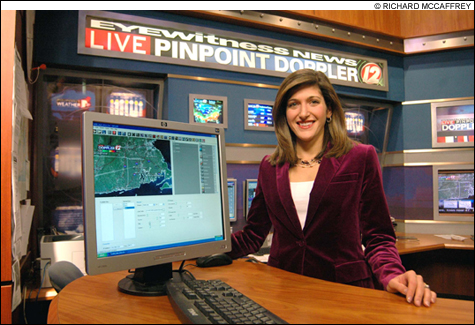
EXTENDING THE BRAND: Muscatello and other meteorologists serve as attractions for their stations,
glad-handing at schools and other venues. |
If you’re a Rhode Island TV news outlet, you certainly don’t hide your Doppler under a bushel. You use it, and you make sure that viewers know about it.
Technology plays a prominent role in branding a station’s weathercast, as do the familiar personalities marshaling the gear. Channel 12 (WPRI) has Pinpoint Doppler-wielding Tony Petrarca, Channel 10 (WJAR) counters with Gary Ley and his VIPIR, while Channel 6 (WLNE) sends Mark Searles and the StormTracker into battle.
While quick-changing coastal conditions and New England’s four seasons play a role, the biggest factor in explaining the prominence afforded local weathercasts is the collective memory of the Big One. “We’re still getting over the Blizzard of ’78 mentality,” says veteran Channel 10 weatherman John Ghiorse. More than two feet of snow fell in Providence during the two-day February 1978 storm, trapping thousands in their homes and cars, and leaving many southern New Englanders with a lemming-like tendency to clog supermarkets — reflexively buying bread and milk — when even a small amount of snow is forecast.
But our climate and once-in-a-generation severe weather events aren’t the whole story. Southern New England is hardly the only area of the country with storms and variable weather; nor is feverish coverage of low-pressure systems unique to this region. In Rhode Island — as elsewhere — high-octane weather reports are part and parcel of promoting local newscasts. Seen this way, local newscasts stoke the meteorological frenzy of viewers as much as they respond to it.
For those working in tourism, construction, fishing, and some other professions, the weather is important, even vital. For many others, it’s handy for gauging the morning commute, or predicting the likelihood of junior’s soccer game being cancelled. “It impacts everyone’s lives, from putting kids on the school bus to pouring a foundation,” notes WJAR news director Betty-Jo Cugini.
And while not everyone is fascinated by politics or even the Patriots, it’s hard to find anyone who lacks a passing interest in the weather — unless they are incarcerated without yard privileges.
The universality of sunshine and rain, in fact, and the apolitical, non-controversial nature of the weather make it the perfect centerpiece for a local newscast. When a weather story plays near the top of the TV news — a surprisingly common occurrence — the line between weather and news blurs, and in addition to an update from the meteorologist, reporters are dispatched to T.F. Green, a frigid overpass on Route 95, rain-soaked Kennedy Plaza, wherever the flakes or raindrops might be falling.
A major storm that shuts down roads and airports and causes communications and power outages is a big deal, of course, although such instances are rare.
“A lot of storms are hyped,” admits Ghi¬orse, noting the tendency to talk about every tropical depression in terms of Hurri¬cane Katrina, and to relate snowstorms to the infamous 1978 event. Channel 12’s Michelle Muscatello concedes that there are but a half-dozen times a year when weather is likely to seriously impact people’s lives or property, yet even that estimate may be generous.
Former television news producer Alan Schroeder, a professor of journalism at Northeastern University in Boston, notes that weather doesn’t have many downsides as a story since it affects everyone. “It’s almost too easy as a lead,” he says, adding, “It’s a bit of a lazy choice.”
In other words, if a tree falls on a suburban street during a storm, you might not hear it, but you will get pictures at six and 11 — either from a crew dispatched to the scene, or thanks to a concerned citizen snapping a photo and e-mailing it to the station.